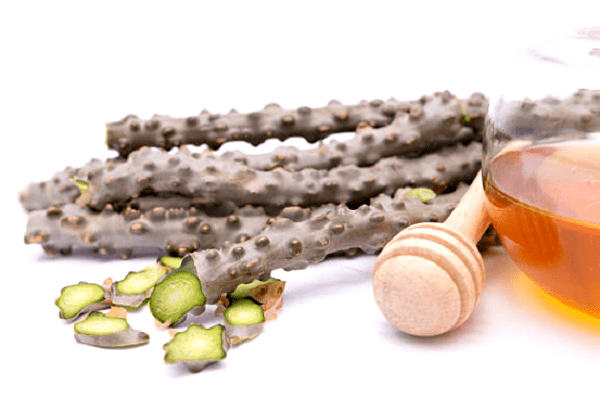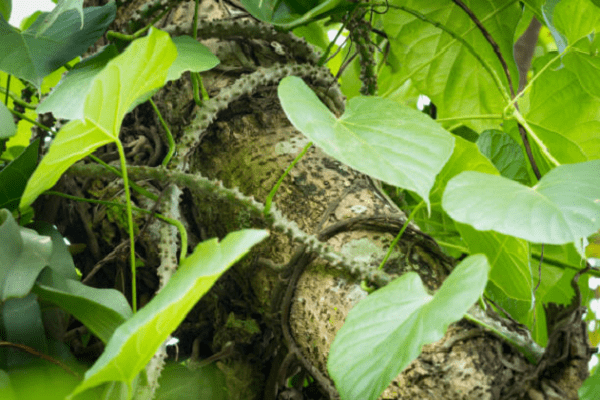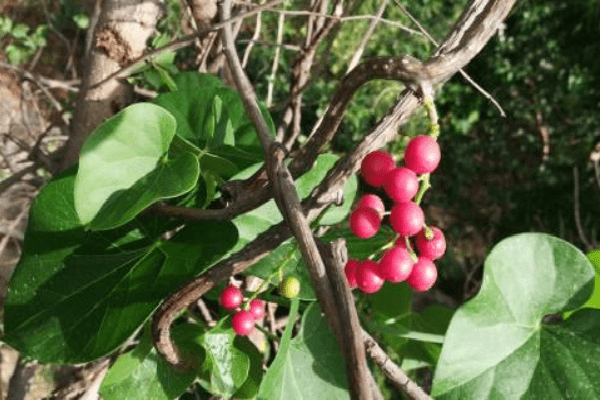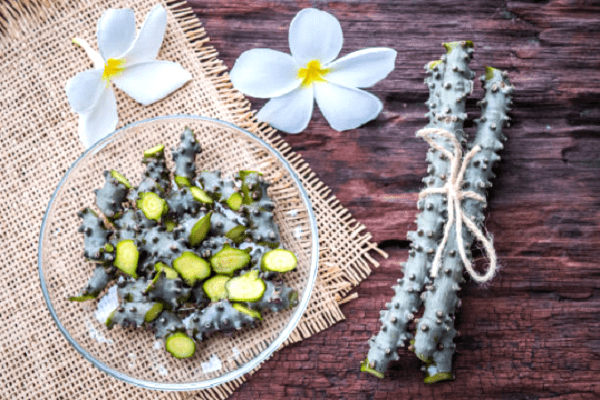Plants with a healing effect >>>> Tinospora - beneficial properties and uses
Tinospora - beneficial properties and uses.

Tinospora cordifolia - a plant of tropical forests, a climbing liana tree shrub - a parasite that grows and feeds on the tree - the host. Tinospora grows naturally in the forests of Asia, Australia, Africa.
The liana shrub itself is a carrier of various groups of endophytic fungi, which have useful properties that are attractive for herbal medicine methods. The stems and bark of the plant have a cork consistency. For medicinal and economic purposes, the stems and roots of the plant are used, which are dried and crushed to a powdery state. But despite the fact that the plant blooms and bears very beautifully, its flowers and fruits are not used either internally or externally.

The plant is popular in folk medicine (in Ayurveda) of the regions in which it grows, and in other regions it can be purchased in pharmacy chains in the form of a ready-to-use powder.
The plant has other names that are often found in the sale of herbal ingredients: Guduchi, Amrita, Makabugai, Giloya (Giloe), Tinospora Cordifolia.
Tinospora powder is fat- and water-soluble, used in the form of aqueous extracts. Depending on the percentage of oily fractions in the plant, Guduchi is a satva (high-carbohydrate product), Guduchi is a taipa (oil).
The fat-soluble properties of Tinospora powder make it suitable for use as a nutritional supplement with a therapeutic effect.

The useful properties of Tinospora are diverse: in nature, endophytic fungi of Tinospora can play the role of insecticides, antiseptics, immunostimulants, antiallergic substances, adaptogens.
Tinospora, as an anti-inflammatory and anti-allergenic agent, is more often used externally - applications, compresses, baths are made on the skin, carrying an antiseptic, soothing and wound healing effect. For these purposes, plant oil extracts or aqueous-alcoholic solutions are used.
Aqueous solutions of Tinospora extract, powders and oils are used to improve the condition of the gastrointestinal tract in inflammatory diseases of the gastrointestinal tract, as a general tonic and immunomodulating agent.
Many properties of Tinospora (hormone-stimulating, antitoxic, antiallergic, immunostimulating and adaptogenic) have been tested in animals (mice), but in humans, when Tinospora is used, immunostimulating reactions are most pronounced, since the plant contains significant amounts of saponins and alkaloids, which trigger the natural mechanism of immune reactions on plant toxic components, which results in the activity of the urinary system, stimulation of the gastrointestinal tract, an increase in the general tone of the body. A special set of natural components of Tinospora plays the role of an irritant, to which the body reacts, forcing almost all organ systems to work actively.
Most often Tinospora is a part of pharmaceutical herbal preparations as an integral component along with other herbal products.

Contraindications to the use of drugs and products made with the use of Tinospora: categorically excluded during pregnancy, acute intoxication, in the midst of diseases of any etiology.
Usually Tinospora is used as a prophylactic and tonic agent on the eve (and not in the midst of) respiratory infections, to stimulate the production of digestive enzymes, as a stimulator of cardiac activity (with drowsiness, fatigue, a decrease in the general tone of the body).
Before using preparations from Tinospora, it is necessary to consult a doctor in order to know whether the biologically active characteristics of the plant will affect the disease in the history for the worse.

Read

Read



























